NI 100: 'Peace in Northern Ireland is credit to people'
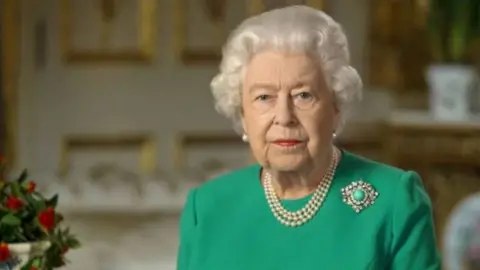 BBC
BBCThe continued peace in Northern Ireland is a credit to its people, the Queen has said.
In a message to mark 100 years since the creation of NI, she called it "a significant centenary for both the United Kingdom and Ireland".
"This anniversary reminds us of our complex history," she said.
She added that it provided "an opportunity to reflect on our togetherness and our diversity".
Her message came exactly 100 years since the state was founded on 3 May 1921.
Legislation was enacted which created a border in Ireland for the first time, and led to its partition.
The Queen also paid tribute to NI's "rich mix of identities, backgrounds and aspirations".
She said political progress and the peace process were "rightly credited to a generation of leaders who had the vision and courage to put reconciliation before division".
"Above all, the continued peace is a credit to its people, upon whose shoulders the future rests," she added.
She also acknowledged the contribution of "our friends and closest neighbours" towards peace in Northern Ireland. She recalled her visit with Prince Philip to Ireland ten years ago.
Sending her warmest good wishes, she said: "Across generations, the people of Northern Ireland are choosing to build an inclusive, prosperous, and hopeful society, strengthened by the gains of the peace process.
"May this be our guiding thread in the coming years."
Allow X content?
Prime Minister Boris Johnson called it a "very significant national anniversary".
Throughout this centenary year, the government would highlight all that is brilliant about Northern Ireland, he said on Twitter.
From its "world class fintech industry and research capabilities" to its "inspiring young people and its vibrant culture of arts and sport".
But he added that it was important to reflect on Northern Ireland's "complex history".
"People from all parts of Northern Ireland, the Republic of Ireland, the United Kingdom and across the globe will approach this anniversary in different ways with differing perspectives," he said.
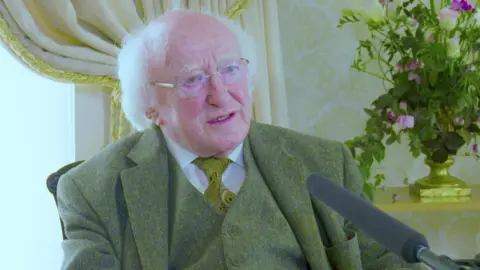
Meanwhile, Irish President Michael D Higgins has urged caution about how the events on the island a century ago are interpreted.
"We have much, much more information. Take advantage of the new material that we have," he said in an interview for BBC Radio Ulster's Talkback programme.
"There are events that took place and, I think, they should be recalled in their factual setting as much as possible."
'Time for reflection'
Brandon Lewis, who is the Northern Ireland Secretary, also said it was a time for reflection.
Speaking to BBC News NI, Mr Lewis ruled out calling a border poll on Irish reunification in the near future.
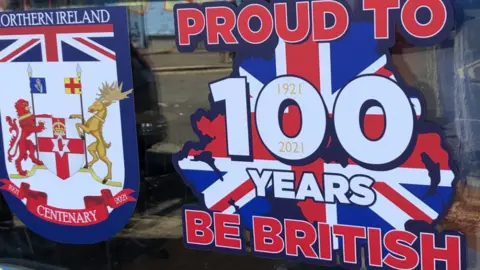
Looking back on what happened on 3 May 1921, he said: "It's not just the start of Northern Ireland as we know it, it's the start of the United Kingdom as we know it."
Mr Lewis said he recognised that there had been "difficult periods" in the past, and that people disagreed over the future.
However, he added: "A hundred years on, Northern Ireland is a beacon around the world with the Good Friday Agreement for how to reconcile, and have peace and prosperity and grow from what has been a troubled past in some part.
"I think there is a lot to be hugely proud of, not least of all when you look at the innovation and enterprise that's across Northern Ireland."

The BBC News NI website has a dedicated section marking the 100th anniversary of the creation of Northern Ireland and partition of the island.
There are special reports on the major figures of the time and the events that shaped modern Ireland available at bbc.co.uk/ni100.
Year '21: You can also explore how Northern Ireland was created a hundred years ago in the company of Tara Mills and Declan Harvey.
Listen to the latest Year '21 podcast on BBC Sounds or catch-up on previous episodes.

Mr Lewis said at the moment people want the focus to be on "getting the economy back into a position where it can grow and develop and deliver jobs" as we come out of the pandemic.
Asked if he believed Northern Ireland would still exist in another 100 years, he said: "I think there will be a Northern Ireland in the years ahead.
"Northern Ireland's story is still in the making and what it has to offer the world is a phenomenal place to live, to work, to grow and spend time," he added.
In a detailed statement, Colum Eastwood, leader of the Social Democrat and Labour Party (SDLP) called for an "open and generous" conversation about the constitutional future.
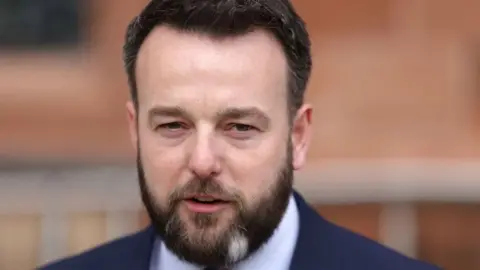 PA Media
PA Media"I recognise and respect that for many people, Northern Ireland is a critical part of their identity and I absolutely want them to have the space to celebrate that," said the SDLP leader.
"But for many, partition was an act of immense constitutional trauma that severed relationships, economic opportunities and created a new state where sectarian discrimination was hardwired into the institutions of government.
"That's also why the experience of communities like mine, and of people like me, are critical to this story and should be heard."
'Look to the future'
The Northern Ireland Economy Minister, Diane Dodds of the Democratic Unionist Party (DUP), said the centenary presented an opportunity to celebrate past achievements but also look to the future.
"From having a reputation as leaders in shipbuilding, rope works and linen mills over the past century, Northern Ireland is now established as a global leader in cyber security, fintech and advanced manufacturing," she said.
The Ulster Unionist Party (UUP) leader Steve Aiken said the centenary was "a time of pride, commemoration and hope for the future".
"The achievements in science, industry, sport, the arts and so much more, has shown that our greatest asset, our people, have not only been influential in our nation of the United Kingdom but across all of these islands and across the globe."
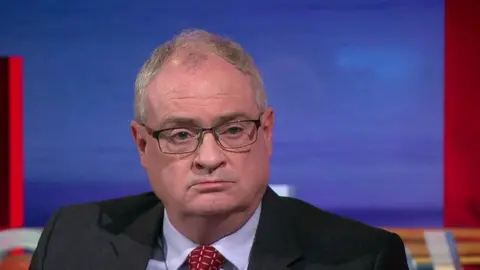
He said the "very real impact of terrorism must never be forgotten" as it has driven many people away from Northern Ireland.
"That the scourge of sectarianism, of hatred and bigotry has blighted generations of our people, is a sad reflection," Mr Aiken said.
"I want to live in a Northern Ireland where our diaspora want to come back, to visit, to rekindle their links, to invest in, and to be proud of."
Official events to mark the centenary of Northern Ireland will include a special post-mark, an inter-denominational church service and a plan to plant a tree at every school.
The programme of events also includes an investment conference, a concert and a centenary rose.
The interview with President Higgins on BBC Radio Ulster's Talkback programme can be accessed on BBC Sounds.
